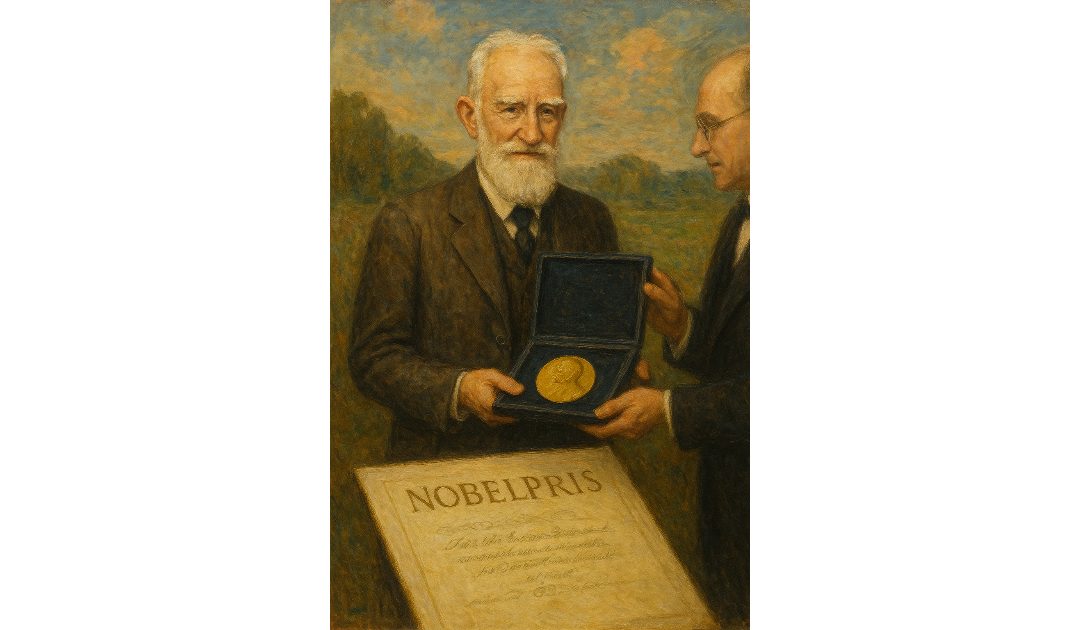The great playwright, George Bernard Shaw, died on the 2nd of November, 1950, aged 94. George Bernard Shaw was born on the 26th of July, 1856, in Dublin. He was a towering figure in the world of literature, known for his wit, sharp intellect, and profound influence on both drama and social thought. His Saint Joan was one of the plays I studied for O Level English Literature. However my favourite Shaw play is You Never Can Tell.
Early Life and Education:
Shaw was born into a lower-middle-class family, grappling with modest means and a troubled household. His father, George Carr Shaw, struggled with alcoholism, while his mother, Lucinda Elizabeth Gurly Shaw, was an accomplished singer and music teacher. Despite the family’s financial constraints, Shaw received an education at Wesley College, Dublin, though he later criticised the school system for its rigidity and lack of practical focus. A largely self-educated man, Shaw was an avid reader, immersing himself in classics, music, and political literature, laying the foundation for his future intellectual pursuits.
Move to London and Early Career:
In 1876, Shaw moved to London, driven by aspirations of becoming a writer. The initial years were marked by hardship and rejection, as he faced repeated failures with his early novels. Undeterred, Shaw immersed himself in the vibrant cultural and intellectual life of London. He became involved with the Fabian Society, an organisation committed to the gradual implementation of socialist principles through democratic means. Shaw’s engagement with the Fabians significantly shaped his political views, and he emerged as a passionate advocate for social reform, championing causes such as women’s rights, income equality, and anti-vivisection.
Literary Achievements:
While his novels struggled to gain recognition, Shaw found his true calling in drama. His plays, characterized by sharp wit, satire, and social commentary, revolutionised the Victorian theatre, challenging moral conventions and provoking thought. His breakthrough came with plays like Arms and the Man (1894) and Candida (1897), which showcased his unique ability to blend humour with serious social critique.
Perhaps his most celebrated work, Pygmalion (1913), exemplifies Shaw’s genius in exposing societal hypocrisies. The play, which tells the story of Professor Henry Higgins transforming Eliza Doolittle from a Cockney flower girl into a refined lady, is not merely a tale of transformation but a sharp critique of class distinctions and the superficial nature of social mobility. The play’s enduring popularity was cemented when it was adapted into the musical My Fair Lady.
Shaw’s other notable works include Man and Superman (1903), Major Barbara (1905), and Saint Joan (1923), the latter earning him the Nobel Prize in Literature in 1925. The Nobel Committee praised his work for its idealism, humanity, and stimulating satire. Shaw accepted the honour but declined the monetary prize, jesting that “I can forgive Alfred Nobel for inventing dynamite, but only a fiend in human form could have invented the Nobel Prize.”
Philosophy and Social Activism:
Shaw’s writing was deeply intertwined with his philosophical and political ideologies. A staunch socialist, he believed in the redistribution of wealth, social equality, and the need for systemic reforms to address societal injustices. His involvement with the Fabian Society saw him advocate for policies such as the establishment of a minimum wage, universal healthcare, and educational reform—ideas that were radical at the time but have since become integral to many modern welfare states.
Shaw was also an ardent vegetarian, anti-vivisectionist, and critic of organised religion, often challenging prevailing norms with his iconoclastic views. His wit and eloquence made him a formidable public speaker, capable of captivating audiences while advocating for controversial causes.
Personal Life:
In 1898, Shaw married Charlotte Payne-Townshend, an Irish heiress and fellow Fabian. Their marriage was unconventional, marked more by intellectual companionship than traditional romantic norms. Despite his widespread fame, Shaw led a relatively modest life, focused on his writing, lectures, and activism.
Legacy:
George Bernard Shaw passed away on the 2nd of November, 1950 at the age of 94. His legacy is monumental, not just as a playwright but as a thinker who challenged society to reflect on its values and assumptions. His works continue to be celebrated for their intellectual rigor, wit, and relevance to contemporary issues.
Shaw’s influence extends beyond literature; his ideas have permeated political thought, theatre, and cultural discourse. His fearless critique of societal structures and his commitment to social justice resonate with audiences even today, affirming his place as one of the most significant figures in modern intellectual history.

